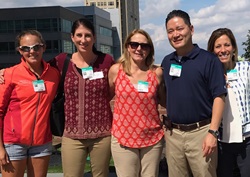Margaret Finley’s research has strongly relied on biomechanical analyses of human dynamics in functional activities, translating scientific innovation into clinical practice. Her interest is accessible and inclusive physical activity programs to mitigate physical and psychosocial secondary conditions in individuals with chronic mobility impairments, activity and participation limitations. Her ongoing work will provide specific information on how pain, biological, psychological and social determinants impact community participation in individuals, specifically from the transition from the acute phase following newly acquired SCI throughout community re-integration. Employing quantitative, qualitative and mixed methods, she utilizes lived experience perspectives and identifies needs regarding physical activity and community engage of individuals with SCI. Currently her lab is developing accessible, inclusive physical activity programs to address psychological factors, social factors and activity engagement to mitigate the long-term adverse effects of inactivity in people with disabilities. She has had ongoing funding and is currently funded by a Department of Defense Clinical Trial Award and a Department of Defense Clinical Translation Trial Award, the Craig H. Neilsen Foundation Psychosocial Portfolio and the Pennsylvania Department of Health SCI Research Platform.
Principal Investigator
Margaret A. Finley, PT, PhD
Associate Professor - Physical Therapy & Rehabilitation Science
Health Sciences Building, 11th Floor, Room 11W49
60 N. 36th Street, Philadelphia, PA 19104
Email: maf378@drexel.edu
Publications
Pub Med | Scopus
Tele-Exercise to Promote Empowered Movement in Individuals with Spinal Cord Injury, TEEMS (2025–2029)
Funded by CDMRP SCIRP Clinical Trial Award (HT94252510367)
This randomized controlled trial will evaluate the effectiveness of tele-exercise to promote empowered movement in individuals with SCI (TEEMS), an online group exercise program, compared to a self-guided video library to improve physical activity, exercise beliefs, quality of life, pain, sleep and wellbeing.
Role: Principal Investigator
Improving Cardiometabolic Health in Individuals with SCI Using Home-based Interactive Virtual Gaming (2024–2027)
Funded by CDMRP SCIRP Clinical Translation Award (HT9425-24-1-0878)
Our goal is to assess the cardiometabolic efficacy of a home-based immersive virtual exercise platform, VR-Move, specifically informed by the exercise needs of a functionally diverse population of individuals with SCI. A pilot clinical trial will establish preliminary efficacy, feasibility and acceptability of the novel device (VR-Move exercise platform) and aid in intervention refinement as project completion will offer initial validation of a novel health promoting modality informed by individual with SCI and SCI experts.
Role: Principal Investigator
Integrated tele-exercise for individuals with SCI: physical, psychological and social responses (2022–2026)
Funded by Pennsylvania Department of Health SCI Research Program and Craig H. Nielsen Foundation
Our goals to engage individuals with spinal cord injury (SCI) as informed stakeholders and implement a participant-centered health and wellness program that addresses specific needs for accessible, individualized, peer-oriented physical activity and considers psychological and social wellness of a diverse individuals with SCI, across the lifespan. Our project examines a community-based telehealth and wellness program that integrates physical activity and social engagement with an emphasis on promoting psychosocial wellbeing in individuals with SCI.
Role: Principal Investigator
Aerobic capacity and exercise intensity of virtual reality in people with spinal cord injury (2024–2025)
Funded by The College of Nursing and Health Profession Office of Research Innovation
This project will determine the reliability of the aerobic capacity testing protocol in individuals with SCI and ability of virtual reality to elicit moderate-vigorous intensity exercise responses.
Development of a Biopsychosocial Prospective Surveillance Model of Shoulder Pain in Individuals with Spinal Cord Injury (2017-2021)
Funded by s CDMRP Spinal Cord Injury Research Program (Award W81XWH-17-1-0476)
This study investigated the progression of musculoskeletal and psychosocial impairments for the first year following SCI, starting with inpatient rehabilitation, at 6 months, and at 1 year following injury. Our research is performed at two facilities: Drexel University (in collaboration with Magee Rehabilitation Hospital and Good Shepherd Rehabilitation Hospital) and the University of Maryland Rehabilitation & Orthopaedic Institute. We aimed to identify sources of biopsychosocial shoulder pain to establish effective physical and cognitive-behavioral treatment to prevent loss of function and independence in individuals with SCI who depend on their arms for activities of daily living, transfers, and wheelchair propulsion. Early identification of problem areas may provide a method to refer a patient for treatment or to change ongoing intervention. Development of a biopsychosocial prospective surveillance model will provide a proactive approach to reduce the debilitating consequences of activity limitations and participation restrictions in individuals with SCI, reducing the burden currently experienced by military service members, veterans, and their families and caregivers.
Role: Principal Investigator
Research Collaborations
Internal Collaborators
- Laura Baehr, PT, DPT, PhD
- Girija Kaimal, EdD, MA, Creative Arts Therapy
- Michael Bruneau, Jr, PhD, ACSM, EP-C, NASM CPT, Health Sciences
External Collaborators
- Shivayogi Hiremath, PhD - Temple University
- Mary Schmidt-Read, PT, DT, MS- Spinal Cord Injury Program Director and Research Coordinator, Magee Rehabilitation Network, Thomas Jefferson University
- Henry York, MD, Chief of the Spinal Cord Injury (SCI/D) Service at the VA San Diego Healthcare System (VASDHS)
